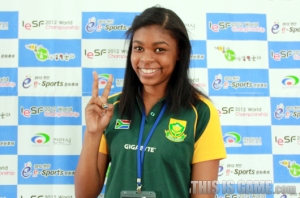With the amount of professional gamers out there streaming, coaching and [under]achieving, how do females fit into the whole scene? Females are a minority receiving the community’s strongest criticisms, but also receiving the least opportunities. The game doesn’t distinguish males from females, yet some organizations like to sell females just playing video-games more so than exposing them as a different gender with the same amount of determination and deserved respect.
Within this piece, we will examine weights of a narrowly-exposed group of players and how the wrong community view(s) can ultimately tear down an aspect of E-Sports that could need the most growth.
Right now, females suffer from 2 prejudices
- “Females gamers are being signed for being a female rather than any real remarkable achievements.”
- “Female gamers who are not achieving, don’t deserve to be on a team.”
(It’s a vicious circle: Female gets on a team without any achievements, female remains on the team but never sent to any events or actively used in team leagues. Never exposed, she never achieves anything or is a part of any team achievements).
With these preconceived notions, females are caught only being able to promote themselves through their gender.
While several solutions have been tried to remedy the absence of achievements like female-only tournaments, they have not been aggressively put into use and advertised appropriately. Counter-Strike is the only exception to this and female teams have gained recognition for their achievements when playing in women’s leagues. The bottom line is, however, that community misperception is the detriment of female progaming divisions across the competitions. It is because we compare men to female that we hinder the growth of one that is quite dissimilar to the other.
Community mis-perceptions, such as comparing males to females quantify two differencing genders.When we compare, we look at how much each gender has succeeded, with more progaming males, a higher rate of success whereas females are on the other end of the spectrum (less females, lower rate of success). Problem is, we criticize females for their lack achievements while ignoring the amount of failures (losses) males have accrued more of. When we disapprove of females, it is often due to our knowledge of male capabilities and chances to succeed with the omission of the overall numbers. Women-only tournaments are not about the separation from men but rather the desire to create its own female heroes. Females should be praised for their own separate achievements; different standards and expectations for different types of people.
Aren’t we then setting a lower standard for females over males?
No, that is a comparison; we are actually just setting a system or scale for female E-sports. Females should have female tournaments and the reason for these events is that you want to expose all sectors of an E-Sport. As one user said on the topic of female-only tournaments:
“I just want to say chess has a female-only World championship. Women are allowed to play in normal tournaments–in fact, Polgar, the strongest female player perhaps ever, never competed in the female World championships–but they also have one that is exclusive to them.
It’s not emphasizing a disparity so much as a difference. Tournaments only for a country isn’t racist; tournaments only for women aren’t sexist. In any area where one group dominates in both numbers and skill, it’s okay to have separate systems to encourage other groups to join.
Especially since, and let’s be completely honest, e-sports/dota is pretty much male-dominated, we should do everything to encourage new players.”
This falls into place with my: “regional tournaments to promote regional champions” from my last article (Passionate Progamers). Gender/Sex has parallels with geographic location, except its biological. The argument of having regional tournaments for American and European players is the same for males and females; champions within their socio-cultural reach. While it may seem like we want to increase the number of champions in a given year, we are, in fact, asking for the term to be widened in diversity. Right now, females in StarCraft II are used for more marketing purposes and pushed less to achieve, especially when the opportunity to succeed is about once a year.
 Right now, there are a wide variety of females who obtain little to no credit for their recent accomplishments: such as the IESF female winners.
Right now, there are a wide variety of females who obtain little to no credit for their recent accomplishments: such as the IESF female winners.
(At right: 15-year South African, Gabriella Issacs takes second place at IESF Female. — Photo courtesy from ThisIsGame)
We need to praise those who achieve and value others who try. In the case of females, it is a lot easier to distinguish those who participate in tournaments and others who play the game for more entertainment purposes. While entertainers are found throughout the scene, a heavy favoritism should be put towards those who seek to extend the potential ability of the female gender rather than take advantage of it. In CounterStrike, female leagues and teams are still in growth (ESWC and ESL), however, they are much more ahead of the RTS scene who has had only two recent major events for females (Zowie Divina and lESF).
Nonetheless, in the end, it comes down to one’s own opinion about the importance of female players. I don’t think there is a real objective answer that would soothe all mind and souls about this predicament. Females sit uncomfortably on a double-edged sword where they cannot be proud of their gender without being indiscriminately bashed nor can they earn the recognition of being who they are.
Should gender matter in a fair and equal world?
Nope.
Should women be accepted as different and a minority? Yes, acceptance is the key here and with openness comes the push to improve.
Armchair Athleticism series post #5 – Originally posted on November 18th, 2012.






Published: Mar 26, 2013 10:45 pm